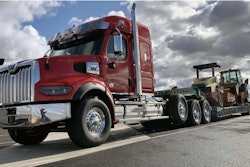Trucking news and briefs for Wednesday, June 4, 2025:
CARB expects OEM partnership to survive waiver repeal
One thing that’s certain regarding the California Air Resources Board’s recent emissions regulations is that Congress has revoked the state’s authority to implement and enforce them. What’s not certain, however, is whether CARB’s Clean Truck Partnership (CTP) with truck and engine manufacturers will remain in place.
Shortly after the Senate vote that effectively sealed the fate of CARB’s Advanced Clean Trucks and Omnibus Low-NOx rules, California officials indicated they would be pursuing litigation to attempt to keep the rules in place.
Regardless, recent reporting by Overdrive sister publication CCJ’s Jason Cannon found that CARB intends to move forward with the emissions plan previously agreed to by all the major North American truck OEMs. Cummins, Daimler Trucks North America, Hino, Isuzu, then-Navistar, Paccar, the Truck and Engine Manufacturers Association, and Volvo Group North America in July 2023 were among 11 signers of the CTP, an agreement with CARB that pledged truck and engine manufacturers will meet California’s vehicle standards and required the sale and adoption of zero-emission vehicle (ZEV) technology, "regardless of whether any other entity challenges California’s authority to set more stringent emissions standards under the federal Clean Air Act."

According to the CTP: “The OEMs commit to meet, in California, the requirements of the relevant regulations … and any agreed upon modifications per this Agreement, regardless of the outcome of any litigation challenging the waivers/authorizations for those regulations, or CARB’s overall authority to implement those regulations.”
"Our position is that, right now, there’s been no change to the CTP, and we don’t expect any," a CARB official told CCJ. The official declined to say whether CARB had shared its position with the truck and engine OEMs.
Language in the agreement calls for OEMs to meet both the Omnibus regulation as it existed on Dec. 22, 2021, the ACT regulation as it existed on March 15, 2021, and the 100% ZEV sales requirement set forth in Cal. Code Regs title 13, section 2016, as it existed on April 28, 2023.
As part of the CTP, the OEMs agreed to abide by ACT regardless of any outcome of litigation. But repealing the regulations isn't litigating them, noted Clean Freight Coalition Executive Director Jim Mullen.
"I would submit that if ACT waivers are rescinded, the CTP is nullified," Mullen told CCJ. "The agreement says (the OEMs) agree to abide regardless of the outcome of litigation. Litigation is not the issue. What's the issue is Congress said, 'You don't have a waiver anymore,' therefore, there's no waiver. I think they wish they had written it differently, but the fact of the matter is they didn't. The words matter."
Cannon also spoke with Craig Segall, who helped write the Advanced Clean Trucks (ACT) rules while working as Deputy Executive Officer at CARB. Segall said he believes the OEMs remain bound by the CTP.
While the word “litigation” seems to be the sticking point for trucking groups, CARB said the placement of a comma in the CTP makes sure the agreement is still binding.
... regardless of the outcome of any litigation challenging the waivers/authorizations for those regulations, or CARB’s overall authority to implement those regulations.
"I know how it was intended to be read and it is pretty clear that there were two things we got covered there," Segall told CCJ. "They're set off in separate clauses of the agreement. If some litigation happens, we're still going forward. If CARB's authority changes, we're still going forward."
Read more from Cannon’s report about CARB’s plans to move forward with ACT and the Low-NOx rule here, and more about his conversation with Segall and some trucking OEMs here.
[Related: Rollback of CARB emissions regs closer to reality]
Diesel dips to lowest weekly average since September 2021 as spot rates hold
Diesel fuel prices across the U.S. have fallen to their lowest weekly average in nearly four years, based on pricing numbers from the U.S. Energy Information Administration.
For the week ending June 2, EIA reported the average price for a gallon of on-highway diesel was $3.45, down 3.6 cents from the previous week. The last time the national average was lower was the week ending Sept. 27, 2021, when fuel averaged $3.41 across the country.
Broker-posted spot rates during the week ended May 30 were nearly flat from the previous week, as flatbed rates rose for the first time in six weeks and dry van rates declined slightly, according to FTR Transportation Intelligence and Truckstop.
The total market broker-posted spot rate increased three-tenths of a cent. Total rates were more than 2% higher than they were during the same 2024 week as well as versus last year’s second week following Roadcheck. Rates excluding a calculated fuel surcharge were 5.5% higher than they were a year earlier.
Dry van spot rates were down less than a penny during the week after rising nearly 20 cents in the prior two weeks. Refrigerated spot rates fell just over 13 cents after declining only 1 cent during the previous week. Flatbed spot rates increased just under 3 cents from the previous week.
Total load activity fell on the spot market by 14.1% after dropping close to 13% in the previous week.
During the most recent week, diesel was down in all but two regions -- New England and the Rocky Mountain region, which saw increases of less than a penny each. The biggest decrease in weekly fuel prices was seen in the Lower Atlantic region, where prices fell by 4.4 cents, followed by the Midwest, which saw a 4-cent decline.
The cheapest diesel can be found in the Gulf Coast at $3.10 per gallon, while the most expensive fuel is in California at $4.77/gal.
Prices in other regions, according to EIA:
- New England -- $3.89
- Central Atlantic -- $3.77
- Lower Atlantic -- $3.38
- Midwest -- $3.39
- Rocky Mountain -- $3.45
- West Coast less California -- $3.75
ProMiles’ diesel averages during the same week showed prices falling 3 cents to $3.47/gal. According to the ProMiles Fuel Surcharge Index, the most expensive diesel can be found in California at $4.98, the cheapest in the Gulf Coast region at $3.11.
[Related: Post-Roadcheck rates: How did the spot market respond?]
St. Christopher gearing up for virtual 5K
The St. Christopher Truckers Relief Fund (SCF) will host a virtual 5K later this month to raise money for its cause of helping professional truck drivers in need.
The Heart & Sole Virtual 5K is a weeklong event dedicated to supporting the health and wellness of over-the-road truck drivers. The race will be held June 22-28 and can be completed at your own pace -- walk, run or treadmill, wherever you are. Registration is just a $25 donation, and all proceeds go to SCF.
“Truckers keep our economy moving, often at the expense of their own health and personal needs,” said Lindsey Bryan, Health & Wellness Manager of SCF. “The Heart & Sole Virtual 5K is a chance for people everywhere to give back, while also doing something good for their own well-being.”
[Related: Of personal bests, the St. Christopher fund, and trucking', writin' and runnin']









